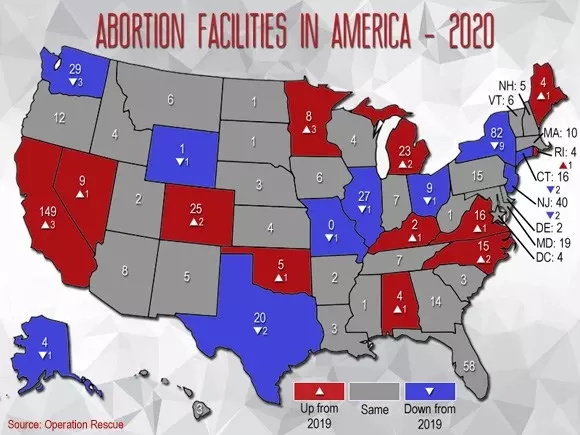Part one of a two-part special investigative report
(Operation Rescue) A total of 45 abortion facilities closed or halted abortions nationwide in 2020, leaving one state without an active abortion facility, according to a survey conducted by Operation Rescue.
Missouri has become the first Abortion-Free State – at least in practice for now. The embattled Reproductive Health Services Planned Parenthood in St. Louis was the last abortion facility in Missouri. It remains open, but Operation Rescue has confirmed that no abortion appointments have been available there for months, and none are available anytime in the foreseeable future. All abortion appointments are now being referred to the Fairview Heights Planned Parenthood facility across the Mississippi River in Illinois.
[Click here to subscribe to Pregnancy Help News!]
RHS Planned Parenthood won a dramatic licensing battle with Missouri in May after an Administrative Court judge ordered the facility relicensed despite the objections of the Missouri Department of Health and Senior Services, which found the facility to be unsafe and out of compliance with state abortion regulations. The DHSS had documented several cases of life-threatening abortion injuries, but their investigation into those incidents were stone-walled by uncooperative Planned Parenthood employees. Shortly after being relicensed, the facility voluntarily halted surgical abortions in Missouri. It had earlier voluntarily halted the distribution of abortion-inducing pills due to an unwillingness to comply with Missouri laws regulating the drugs. (Read more about this licensing battle HERE)
“While the RHS Planned Parenthood remains open and licensed for abortions, we confirmed that none are being done there. That means this facility is currently acting only as an abortion referral center. There is no operational abortion facility in the State of Missouri, making it the first Abortion-Free State at this time,” said Operation Rescue President Troy Newman. “It is obvious that Planned Parenthood of the St. Louis Region, which operates RHSPP, seeks to avoid having to comply with Missouri’s strong pro-life laws, and has opted to abort in Illinois where abortion facilities are essentially unaccountable. This shows a gross disrespect for the lives and safety of the women Planned Parenthood purports to serve.”
Other noteworthy facts were revealed by Operation Rescue’s survey of every U.S. abortion facility.
- There are currently 706 active abortion facilities in the U.S.
- Since Operation Rescue began tracking the number of abortion facilities in 2009, surgical abortion facilities have decreased in number by 255.
- Since 1991, there has been an incredible 79 percent drop in the number of surgical abortion facilities nationwide.
- There was a net loss of four U.S. abortion clinics overall in 2020.
- The number of Planned Parenthood abortion facilities decreased in 2020.
- 2020 was the first year that Operation Rescue tracked the number of facilities that distributed abortion drugs via telemedicine. The survey found that 69 locations, representing 9.78 percent of all abortion facilities, now operate telemedicine abortion programs.
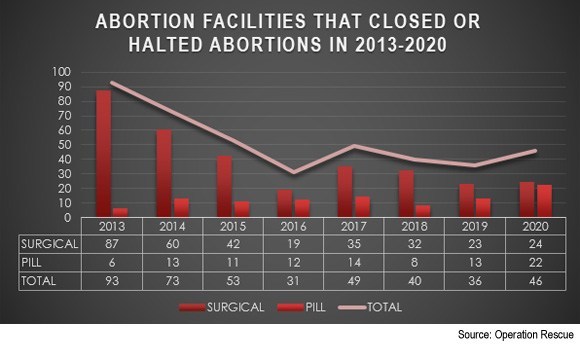
Methodology
Each year, Operation Rescue conducts a nationwide survey that involves contact with each abortion business in the U.S. The information gathered about the abortion clinics and their practices represents the most current and accurate data available.
This most recent data was compiled by Operation Rescue from November 16 through December 16, 2020.
Operation Rescue defines “abortion clinics” as those businesses that conduct abortions outside a hospital setting. There are two categories of abortion clinics:
- Surgical Abortion Clinics: These offices conduct surgical abortions. Almost always, surgical facilities also distribute abortion-inducing drugs.
- Abortion Pill Clinics: These offices supply abortions through the administration of drugs (pills) or other chemical means. They do not conduct surgical abortions.
Abortion facility totals
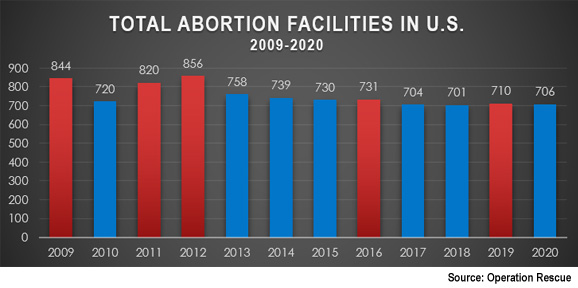
Today, there are a total of 706 U.S. abortion facilities, down a total of four facilities over last year. This marks a return to the downward trend in numbers of abortion facilities nationwide after a slight uptick in 2019 due to an expansion in chemical abortion facilities.
The number of surgical abortion clinics continues to decline with six fewer today than last year at this time.
In fact, the number of surgical abortion clinics has fallen each year for at least the past decade from 713 in 2009 to a record low of 458.
That represents a decrease of 255 surgical facilities — 36 percent – over the past ten years.
“The decline in surgical abortion facilities continues to be bad news for the Abortion Cartel, but is great news for women and their babies,” said Newman. “Surgical abortion facilities are still the most numerous and the most profitable, so when they shut down, it is great news that means lives are being saved.”
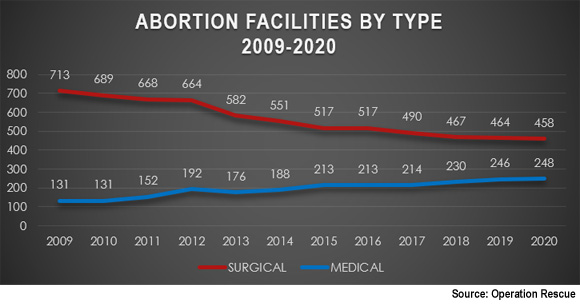
In contrast, abortion pill facility numbers have been steadily on the rise over the past decade, increasing 47.2 percent in the past eleven years.
Today, there are 248 facilities that abort only using chemical means – an increase of only three clinics nationwide in 2020 compared to 15 in 2019. This has slowed Planned Parenthood’s push to expand abortion pill facilities nationwide.
Tweet This: Abortion pill facility #s have increased 47.2% in the past 11 yrs, to 248 today, though the 2020 increase of 3 is down from 15 in 2019
Facilities that closed or halted abortions in 2020
In all, 45 abortion facilities closed or halted abortion services in 2020. Twenty-four of those were surgical facilities, while 21 were abortion pill facilities. This number does not include facilities that temporarily halted abortions, but reopened later in the year.
Interestingly, the largest Democrat states, California and New York, had the most closures or facilities that stopped all abortions. These states were also among the hardest hit with restrictive China Virus lock-downs. There is anecdotal evidence that the restrictions contributed to the inability of some facilities to conduct abortions, but the extent of that impact is unknown at this time.
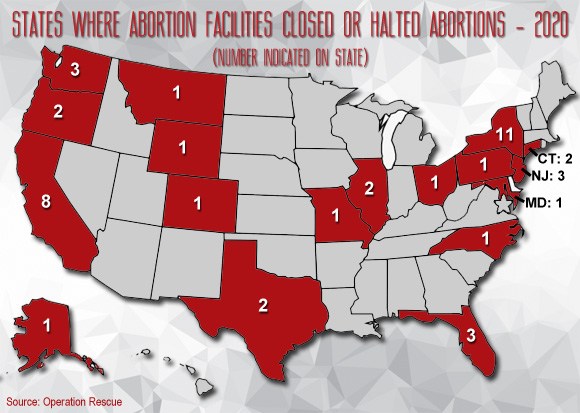
Of the 45 facilities no longer in the abortion business, at least seven indicated that they hoped to begin offering abortions again at some point in 2021. One facility indicated they could not offer abortions until 2021 at the earliest, because they had no abortionist due to the China Virus. There is a likelihood that at least some of those facilities will never resume abortions.
Some notable facilities that closed or stopped conducting abortions are highlighted below.
Read the full Operation Rescue report HERE.
Editor's note: This article was published by Operation Rescue and is reprinted in part here with permission. Heartbeat International manages the Abortion Pill Rescue Network and Pregnancy Help News.



